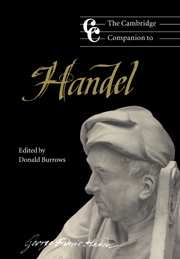Book contents
- Frontmatter
- Introduction
- Part I Background
- Part II The music
- 8 Handel and the aria
- 9 Handel's compositional process
- 10 Handel and the idea of an oratorio
- 11 Handel's sacred music
- 12 Handel's chamber music
- 13 Handel as a concerto composer
- 14 Handel and the keyboard
- Part III The music in performance
- Bibliographical note
- Notes
- List of Handel's works
- Index
11 - Handel's sacred music
from Part II - The music
Published online by Cambridge University Press: 28 September 2011
- Frontmatter
- Introduction
- Part I Background
- Part II The music
- 8 Handel and the aria
- 9 Handel's compositional process
- 10 Handel and the idea of an oratorio
- 11 Handel's sacred music
- 12 Handel's chamber music
- 13 Handel as a concerto composer
- 14 Handel and the keyboard
- Part III The music in performance
- Bibliographical note
- Notes
- List of Handel's works
- Index
Summary
Handel was involved in the composition of sacred music throughout his career, although it was rarely the focal point of his activities. Only during the brief period in 1702–3 when he was organist for the Cathedral in Halle did he hold a church job which required regular weekly duties and, since the cathedral congregation was Calvinist, these duties did not include composing much (if any) concerted music. Virtually all of his sacred music was written for specific events and liturgies, and the choice of Handel to compose these works was dictated by his connections with specific patrons. Handel's sacred music falls into groups of works which were written for similar forces and occasions, and will be discussed in terms of those groups in this chapter.
During his period of study with Zachow in Halle Handel must have written some music for services at the Marktkirche or the Cathedral, but no examples survive. His earliest extant work is the F major setting of Psalm 113, Laudate pueri (HWV 236), for solo soprano and strings. The autograph is on a type of paper that was available in Hamburg, and he may have written it there in late 1706 to take with him to Italy; alternatively, he may have written it at Rome early in 1707 on paper brought with him from Hamburg. The jagged vocal lines for the solo soprano are typical of his early style and may be related to Mattheson's comment that Handel knew a great deal about fugue and counterpoint but ‘very little about melody’ in this period.
- Type
- Chapter
- Information
- The Cambridge Companion to Handel , pp. 164 - 181Publisher: Cambridge University PressPrint publication year: 1997



